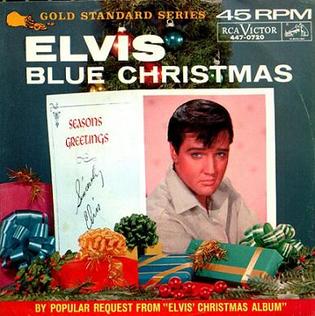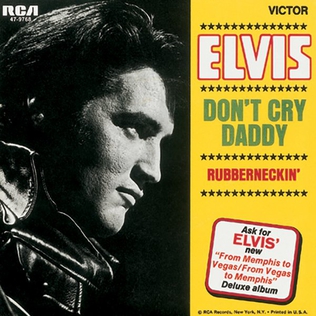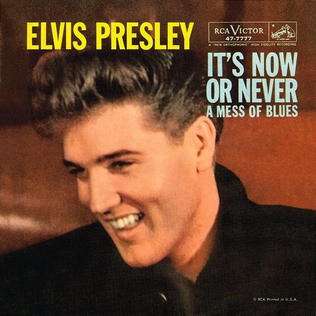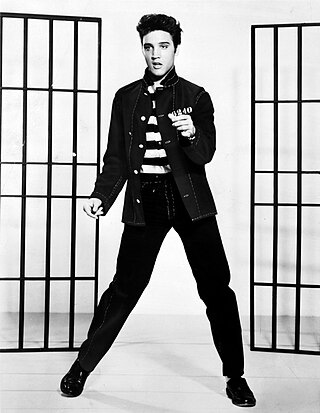"The Wonder of You" is a song written by Baker Knight. It was originally recorded by Vince Edwards in 1958, but this recording has never been released. In an interview with a DJ from Chattanooga, Tennessee, Ray Peterson told the story of how Baker Knight confided that "The Wonder of You" was originally written as a gospel song.

"Way Down" is a song recorded by Elvis Presley. Recorded in October 1976, it was his last single released before his death on August 16, 1977. The song was written by Layng Martine Jr. and was later recorded by Presley at his home studio in Graceland on 29 October 1976.
"Love Letters" is a 1945 popular song with lyrics written by Edward Heyman and music by Victor Young. The song appeared, without lyrics, in the movie of the same name performed by Dick Haymes, and was nominated for the Academy Award for Best Original Song in 1945 but lost out to "It Might as Well Be Spring". The song has been covered by a variety of artists, most notably by Nat King Cole (1957), Ketty Lester (1962), Elvis Presley (1966), and Alison Moyet (1987).

"Stuck on You" was Elvis Presley's first hit single after his two-year stint in the US Army, reaching number one in 1960 in the US.

"Wooden Heart" is a pop song recorded by Elvis Presley. The composition is based on a German folk song "Muss i denn" and it was featured in the 1960 Elvis Presley film G.I. Blues. The song was a hit single for Presley in the UK Singles Chart, reaching No. 1 for six weeks in March and April 1961.

"Blue Christmas" is a Christmas song written by Billy Hayes and Jay W. Johnson and most famously recorded by Elvis Presley, although it was first recorded by Doye O'Dell in 1948. It is a tale of unrequited love during the holidays and is a longstanding staple of Christmas music, especially in the country genre.
"(Now and Then There's) A Fool Such as I" is a popular song written by Bill Trader and published in 1952. Recorded as a single by Hank Snow it peaked at number four on the US country charts early in 1953.
"There Goes My Everything" is a popular song written by Dallas Frazier and published in 1965. "There Goes My Everything" is now considered a country music standard, covered by many artists.

"Don't Cry Daddy" is a 1969 song recorded by Elvis Presley written by Mac Davis. The song was paired with "Rubberneckin'" and both peaked at number six in the United States Billboard Hot 100 chart in January 1970.

"It's Now or Never" is a song recorded by Elvis Presley and released as a single in 1960. The song is one of the best-selling singles by Presley, and one of the best-selling physical singles of all time. It was recorded by Bill Porter at RCA Studio B in Nashville. It is written in E major and has a tempo of 80 BPM.

"My Boy" is a popular song from the early 1970s. The music was composed by Jean-Pierre Bourtayre and Claude François, and the lyrics were translated from the original version "Parce que je t'aime, mon enfant" into English by Phil Coulter and Bill Martin.

"T-R-O-U-B-L-E" is a song written by Jerry Chesnut and recorded by Elvis Presley in March 1975. It was released as a single, as the A-side, with the B-side "Mr. Songman", through RCA Victor that was taken from his album Today. It is not to be confused with the Leiber and Stoller song "Trouble", that Presley first recorded in July 1958, and which was subsequently recorded by numerous other artists.
"Funny How Time Slips Away" is a song written by Willie Nelson and first recorded by country singer Billy Walker. Walker's version was issued as a single by Columbia Records in June 1961 and peaked at number 23 on the Hot C&W Sides chart. The song has been featured in several live action films and television shows, such as in the first episode of the second season of AMC’s Better Call Saul and in the 2020 Netflix drama The Devil All the Time.

"Hurt" is a 1954 song by Jimmie Crane and Al Jacobs. "Hurt" was originally performed by Roy Hamilton, whose version peaked at number eight on the R&B Best Seller chart and spent a total of seven weeks on the chart. A version by Ricky Denell also received considerable radio airplay in 1954 on pop radio stations. The song is considered to be the signature hit of Timi Yuro, whose version went to number four on the Billboard pop chart in 1961. Juice Newton's 1985 version scored number one on Billboard's Country chart.
"Happy, Happy Birthday Baby" is a 1957 song written by Margo Sylvia & Gilbert Lopez. "Happy, Happy Birthday Baby" was originally performed by The Tune Weavers, who had their only hit with this song. Both Margo Sylvia and Gilbert Lopez were members of The Tune Weavers. The single went to number four on the R&B chart and went to number five on the Hot 100. The B-side of "Happy, Happy Birthday Baby, was The Tune Weavers version of "Ol' Man River"

"I'm Yours" is 1961 song recorded by Elvis Presley which appeared on the Pot Luck with Elvis album. The recording was released as a single in 1965. It was written by Don Robertson and Hal Blair.

"Fools Fall in Love" is a song written by Jerry Leiber and Mike Stoller. It was originally recorded by the Drifters, who took it to number 10 on the R&B chart in 1957. The song reached number 69 on the Billboard Hot 100. Elvis Presley also recorded the song in 1966.

The singles discography of Elvis Presley began in 1954 with the release of his first commercial single, "That's All Right". Following his regional success with Sun Records, Presley was signed to RCA Victor on November 20, 1955. Presley's first single with RCA, "Heartbreak Hotel", was a worldwide hit, reaching the No. 1 position in four countries and the top 10 in many other countries. Other hit singles from the 1950s include "Hound Dog", "Don't Be Cruel", "Love Me Tender", Too Much", "All Shook Up", "(Let Me Be Your) Teddy Bear", "Jailhouse Rock", "Don't", "Hard Headed Woman" and "A Big Hunk o' Love". On March 24, 1958, Presley entered the United States Army at Memphis, Tennessee, and was stationed in Germany. He left active duty on March 5, 1960.

"I Can't Help It (If I'm Still in Love with You)" is a song written and originally recorded by Hank Williams on MGM Records. It hit number two on the Billboard country singles chart in 1951. In his autobiography, George Jones printed the first six lines of the song and stated, "Its lyrics couldn't be more simple - or profound."
"For Ol' Times Sake'" is a song by Tony Joe White, covered in 1973 by Elvis Presley.













